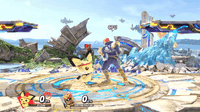Instant double jump: Difference between revisions
No edit summary |
No edit summary |
||
| Line 18: | Line 18: | ||
==Videos== | ==Videos== | ||
{{#widget:YouTube|id=DJfzDibpgKc}} | {{#widget:YouTube|id=DJfzDibpgKc}} | ||
{{#widget:YouTube|id= | {{#widget:YouTube|id=FT1FCiG2c20}} | ||
{{#widget:YouTube|id=UIUvBgRsHH8}} | |||
[[Category:Techniques]] | [[Category:Techniques]] | ||
Revision as of 20:26, July 31, 2023
An instant double jump, or IDJ for short, is the act of inputting a double jump immediately after a jump, ideally as low to the ground as possible.
Details

An instant double jump is a double jump performed immediately after inputting Jump. In most cases, this is done by buffering a double jump during a character's jumpsquat. If done correctly, the particles from the double jump should appear close to the ground.
Since the values that determine double jump height are different from regular jump height, the distance covered by an instant double jump is different from a short hop or full hop -- usually somewhere between the two.
The applications of this are numerous. For example, certain windows for late auto-canceling that are between the two jump heights can be achieved with an instant double jump or IDJ fast fall. In addition, certain aerials that can only be used once during a short hop can be used twice during an IDJ or followed up with additional aerials. This also makes them useful for combos, since the altered jump height can allow you to extend your combo or hit certain follow-ups at percents or positions that would not be possible otherwise.
An obvious drawback of instant double jumps is that they use up your double jump. This can be extremely detrimental if you end up offstage for whatever reason, since recovery becomes much more difficult for a lot of characters without it.

